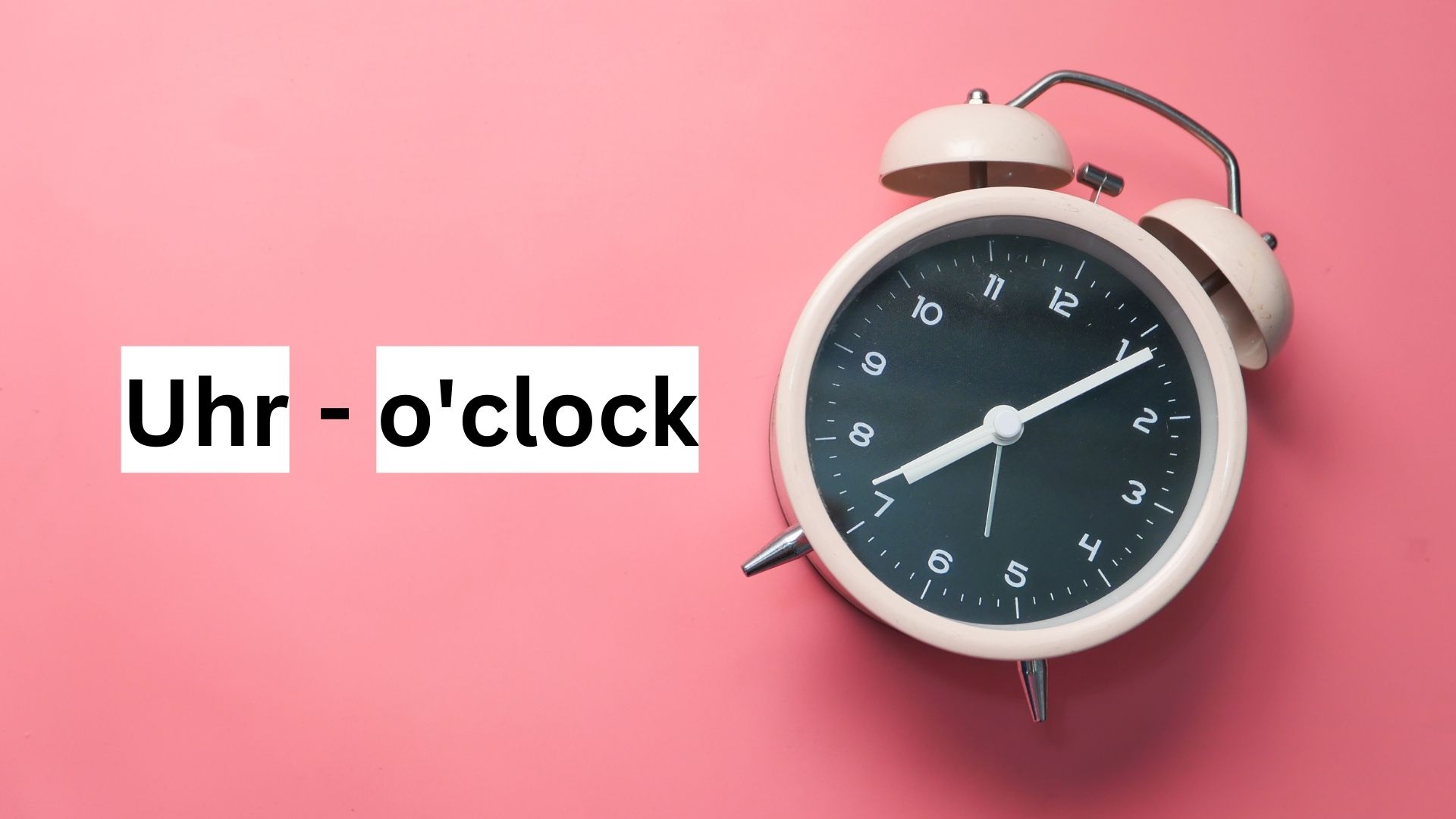Learning to tell time in German is a handy skill. It helps a lot, especially if you plan to spend time in German-speaking areas. In this guide, we’ll start with the basic vocabulary you need to talk about time, from hours to minutes. We’ll also touch on how Germans typically talk about time. We’ll also cover the 12-hour and 24-hour formats. Understanding these can make everyday conversations much smoother. Let’s dive in and start learning!
Basic Vocabulary for Telling Time in German
Numbers and Time-Related Words
Learning to tell time in German starts with knowing basic numbers and keywords about time. You really need to know numbers from one to twelve because they are used a lot for the hours. Also, you should understand words like ‘Uhr’ (o’clock), ‘viertel’ (quarter), ‘halb’ (half), ‘vor’ (before), and ‘nach’ (after). These words are part of how you say the time. Getting these words right helps you tell time correctly. This makes everyday conversations easier when you’re speaking with German speakers.
Numbers
| German | English |
| null | zero |
| eins | one |
| zwei | two |
| drei | three |
| vier | four |
| fünf | five |
| sechs | six |
| sieben | seven |
| acht | eight |
| neun | nine |
| zehn | ten |
| elf | eleven |
| zwölf | twelve |
| dreizehn | thirteen |
| vierzehn | fourteen |
| fünfzehn | fifteen |
| sechzehn | sixteen |
| siebzehn | seventeen |
| achtzehn | eighteen |
| neunzehn | nineteen |
| zwanzig | twenty |
| einundzwanzig | twenty-one |
| zweiundzwanzig | twenty-two |
| dreiundzwanzig | twenty-three |
| vierundzwanzig | twenty-four |
| fünfundzwanzig | twenty-five |
| sechsundzwanzig | twenty-six |
| siebenundzwanzig | twenty-seven |
| achtundzwanzig | twenty-eight |
| neunundzwanzig | twenty-nine |
| dreißig | thirty |
| vierzig | forty |
| fünfzig | fifty |
| sechzig | sixty |
| siebzig | seventy |
| achtzig | eighty |
| neunzig | ninety |
| hundert | one hundred |
| tausend | one thousand |
Time-Related Words

| German | English |
| Uhr | clock, o’clock |
| Stunde | hour |
| Minute | minute |
| Sekunde | second |
| Viertel | quarter |
| halb | half |
| Morgen | morning |
| Nachmittag | afternoon |
| Abend | evening |
| Nacht | night |
| Mitternacht | midnight |
| Mittag | noon |
| Vormittag | before noon, morning |
| Zeit | time |
| Stunde(n) | hour(s) |
| Minute(n) | minute(s) |
| Sekunde(n) | second(s) |
| heute | today |
| gestern | yesterday |
| morgen | tomorrow |
| jetzt | now |
| früher | earlier |
| später | later |
| pünktlich | on time, punctual |
| verspätet | late |
| bald | soon |
| gleich | in a moment |
| damals | back then, at that time |
Also Read: How To Ask Where Is The Toilet & Bathroom In German
Time of Day
To tell time in German, you need to know some basic words. ‘Morgen’ means morning, ‘Mittag’ means noon, ‘Nachmittag’ stands for afternoon, ‘Abend’ for evening, and ‘Nacht’ for night. These words help you talk about daily schedules.
For example, if you say ‘morgens’, it refers to something happening in the morning, like ‘I go jogging in the morning.’ Similarly, ‘abends’ is used for events in the evening. Knowing these terms isn’t just about telling time; it’s crucial for getting around in German-speaking places.
How to Tell Time in German?
Using the 12-Hour Clock System
The 12-hour clock system is popular in German everyday talk and it’s important for learners to understand it for clear communication about time. This system splits the day into two halves: midnight to noon (AM) and noon to midnight (PM).
The Germans don’t usually mention AM and PM outright. To ask the time, you can say ‘Wie viel Uhr ist es?’ or ‘Wie spät ist es?’ You’ll generally hear back ‘Es ist [number] Uhr,’ like ‘Es ist drei Uhr’ which means ‘It is three o’clock.’
If it’s half past the hour, you say ‘halb’ plus the next hour. So, ‘Es ist halb vier’ means ‘It is half past three.’
| German Phrase | English Translation |
| Es ist ein Uhr | It is one o’clock |
| Es ist zwei Uhr | It is two o’clock |
| Es ist drei Uhr | It is three o’clock |
| Es ist vier Uhr | It is four o’clock |
| Es ist fünf Uhr | It is five o’clock |
| Es ist sechs Uhr | It is six o’clock |
| Es ist sieben Uhr | It is seven o’clock |
| Es ist acht Uhr | It is eight o’clock |
| Es ist neun Uhr | It is nine o’clock |
| Es ist zehn Uhr | It is ten o’clock |
| Es ist elf Uhr | It is eleven o’clock |
| Es ist zwölf Uhr | It is twelve o’clock |
| Es ist Viertel nach eins | It is quarter past one |
| Es ist Viertel nach zwei | It is quarter past two |
| Es ist Viertel nach drei | It is quarter past three |
| Es ist Viertel nach vier | It is quarter past four |
| Es ist Viertel nach fünf | It is quarter past five |
| Es ist Viertel nach sechs | It is quarter past six |
| Es ist Viertel nach sieben | It is quarter past seven |
| Es ist Viertel nach acht | It is quarter past eight |
| Es ist Viertel nach neun | It is quarter past nine |
| Es ist Viertel nach zehn | It is quarter past ten |
| Es ist Viertel nach elf | It is quarter past eleven |
| Es ist Viertel nach zwölf | It is quarter past twelve |
| Es ist halb zwei | It is half past one |
| Es ist halb drei | It is half past two |
| Es ist halb vier | It is half past three |
| Es ist halb fünf | It is half past four |
| Es ist halb sechs | It is half past five |
| Es ist halb sieben | It is half past six |
| Es ist halb acht | It is half past seven |
| Es ist halb neun | It is half past eight |
| Es ist halb zehn | It is half past nine |
| Es ist halb elf | It is half past ten |
| Es ist halb zwölf | It is half past eleven |
| Es ist halb eins | It is half past twelve |
| Es ist Viertel vor eins | It is quarter to one |
| Es ist Viertel vor zwei | It is quarter to two |
| Es ist Viertel vor drei | It is quarter to three |
| Es ist Viertel vor vier | It is quarter to four |
| Es ist Viertel vor fünf | It is quarter to five |
| Es ist Viertel vor sechs | It is quarter to six |
| Es ist Viertel vor sieben | It is quarter to seven |
| Es ist Viertel vor acht | It is quarter to eight |
| Es ist Viertel vor neun | It is quarter to nine |
| Es ist Viertel vor zehn | It is quarter to ten |
| Es ist Viertel vor elf | It is quarter to eleven |
| Es ist Viertel vor zwölf | It is quarter to twelve |
Also Read: How To Say “I Don’t Know” And “I Don’t Understand” In German
Using the 24-Hour Clock System
In Germany, many people use the 24-hour clock, especially for official schedules and public transport. This clock starts at 00:00, which is midnight, and goes up to 23:59, just before the next midnight. It helps everyone avoid confusion. When telling the time this way, you might hear someone say ‘Es ist [number] Uhr.’ For instance, ‘Es ist 15 Uhr’ means it’s 3 PM.
Although some still use the 12-hour clock in casual chats, the 24-hour format is common in writing, on TV, and for appointments. Getting the hang of this system really helps if you’re living in or visiting Germany. It makes scheduling and time management much easier.
| German Phrase | English Translation |
| Es ist null Uhr | It is midnight |
| Es ist ein Uhr | It is 1:00 (01:00) |
| Es ist zwei Uhr | It is 2:00 (02:00) |
| Es ist drei Uhr | It is 3:00 (03:00) |
| Es ist vier Uhr | It is 4:00 (04:00) |
| Es ist fünf Uhr | It is 5:00 (05:00) |
| Es ist sechs Uhr | It is 6:00 (06:00) |
| Es ist sieben Uhr | It is 7:00 (07:00) |
| Es ist acht Uhr | It is 8:00 (08:00) |
| Es ist neun Uhr | It is 9:00 (09:00) |
| Es ist zehn Uhr | It is 10:00 (10:00) |
| Es ist elf Uhr | It is 11:00 (11:00) |
| Es ist zwölf Uhr | It is 12:00 (12:00) |
| Es ist dreizehn Uhr | It is 13:00 |
| Es ist vierzehn Uhr | It is 14:00 |
| Es ist fünfzehn Uhr | It is 15:00 |
| Es ist sechzehn Uhr | It is 16:00 |
| Es ist siebzehn Uhr | It is 17:00 |
| Es ist achtzehn Uhr | It is 18:00 |
| Es ist neunzehn Uhr | It is 19:00 |
| Es ist zwanzig Uhr | It is 20:00 |
| Es ist einundzwanzig Uhr | It is 21:00 |
| Es ist zweiundzwanzig Uhr | It is 22:00 |
| Es ist dreiundzwanzig Uhr | It is 23:00 |
| Es ist vierundzwanzig Uhr | It is 24:00 |
| Es ist null Uhr dreißig | It is 00:30 |
| Es ist ein Uhr dreißig | It is 01:30 |
| Es ist zwei Uhr dreißig | It is 02:30 |
| Es ist drei Uhr dreißig | It is 03:30 |
| Es ist vier Uhr dreißig | It is 04:30 |
| Es ist fünf Uhr dreißig | It is 05:30 |
| Es ist sechs Uhr dreißig | It is 06:30 |
| Es ist sieben Uhr dreißig | It is 07:30 |
| Es ist acht Uhr dreißig | It is 08:30 |
| Es ist neun Uhr dreißig | It is 09:30 |
| Es ist zehn Uhr dreißig | It is 10:30 |
| Es ist elf Uhr dreißig | It is 11:30 |
| Es ist zwölf Uhr dreißig | It is 12:30 |
| Es ist dreizehn Uhr dreißig | It is 13:30 |
| Es ist vierzehn Uhr dreißig | It is 14:30 |
| Es ist fünfzehn Uhr dreißig | It is 15:30 |
| Es ist sechzehn Uhr dreißig | It is 16:30 |
| Es ist siebzehn Uhr dreißig | It is 17:30 |
| Es ist achtzehn Uhr dreißig | It is 18:30 |
| Es ist neunzehn Uhr dreißig | It is 19:30 |
| Es ist zwanzig Uhr dreißig | It is 20:30 |
| Es ist einundzwanzig Uhr dreißig | It is 21:30 |
| Es ist zweiundzwanzig Uhr dreißig | It is 22:30 |
| Es ist dreiundzwanzig Uhr dreißig | It is 23:30 |
Conclusion
Learning to tell time in German does more than just help you communicate—it lets you really get the culture. When you know how to ask and talk about time, you feel more at home in German-speaking places. You get to see how language and culture mesh when it comes to talking about time. It’s key for setting up meetings, planning trips, or just chatting day-to-day. This guide has given you what you need, from simple phrases to the 24-hour clock, so you can handle time confidently. Keep practicing, and before you know it, telling time in German will be a breeze. If you want to learn any language easily, keep visiting the Translation Blog regularly.

